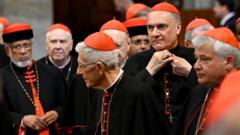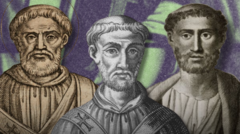In a significant diplomatic moment, former U.S. President Donald Trump cast doubt on the sincerity of Russian President Vladimir Putin's desire for peace in Ukraine, juxtaposed against the backdrop of recent violent attacks on Kyiv. The concerns arose after Trump's meeting with Zelensky during Pope Francis's funeral, which the White House lauded as productive.
Trump Questions Putin's Commitment to Peace After Meeting Zelensky at the Vatican

Trump Questions Putin's Commitment to Peace After Meeting Zelensky at the Vatican
Donald Trump expresses skepticism about Vladimir Putin's intentions following his Vatican meeting with Ukrainian President Volodymyr Zelensky.
Two days ago, Trump took to social media to voice his apprehensions about Putin's approach, suggesting that the Russian leader's military actions indicate a disinterest in negotiating peace. He remarked on the "no reason" behind such attacks on civilians, urging a reevaluation of how the West engages with Moscow. The meeting, described as "historic" by Zelensky, marked their first direct encounter since a tense meeting in February, where Trump accused him of lacking leverage in the conflict.
Underscoring the urgency of the situation, Trump's post on Truth Social hinted at the need for potentially tougher economic measures against Russia, while he also previously characterized peace talks as being close, having initiated communications through his envoy, Steve Witkoff. The Kremlin indicated a willingness to engage in direct negotiations without preconditions.
During their cornered conversation at St Peter's Basilica, both leaders focused on collaborative pathways, set against the Pope's message advocating for peace, as articulated by Cardinal Re during the funeral. Ukrainian officials hinted at a possibility for follow-up discussions in Rome, although Trump's swift departure added uncertainty to those plans.
Despite Trump's past criticisms of Zelensky and pressure on Ukraine to make territorial compromises, leaders like French President Emmanuel Macron extended support for the nation. Zelensky's steadfast rejection of land concessions was clear, reaffirming his stance on Ukraine’s sovereignty while advocating for an unconditional ceasefire as a prelude for peace talks.
As tensions remain high, both political stalwarts recognize the pressing need for a resolution in Ukraine, albeit with differing strategies on how to achieve that crucial objective.
Underscoring the urgency of the situation, Trump's post on Truth Social hinted at the need for potentially tougher economic measures against Russia, while he also previously characterized peace talks as being close, having initiated communications through his envoy, Steve Witkoff. The Kremlin indicated a willingness to engage in direct negotiations without preconditions.
During their cornered conversation at St Peter's Basilica, both leaders focused on collaborative pathways, set against the Pope's message advocating for peace, as articulated by Cardinal Re during the funeral. Ukrainian officials hinted at a possibility for follow-up discussions in Rome, although Trump's swift departure added uncertainty to those plans.
Despite Trump's past criticisms of Zelensky and pressure on Ukraine to make territorial compromises, leaders like French President Emmanuel Macron extended support for the nation. Zelensky's steadfast rejection of land concessions was clear, reaffirming his stance on Ukraine’s sovereignty while advocating for an unconditional ceasefire as a prelude for peace talks.
As tensions remain high, both political stalwarts recognize the pressing need for a resolution in Ukraine, albeit with differing strategies on how to achieve that crucial objective.























